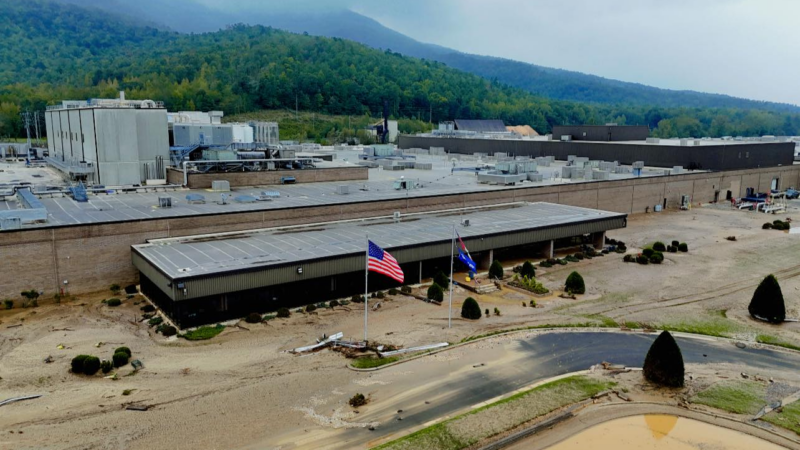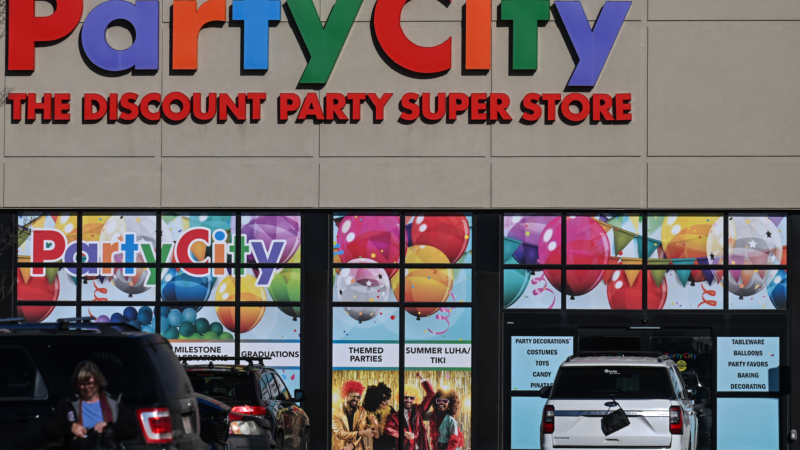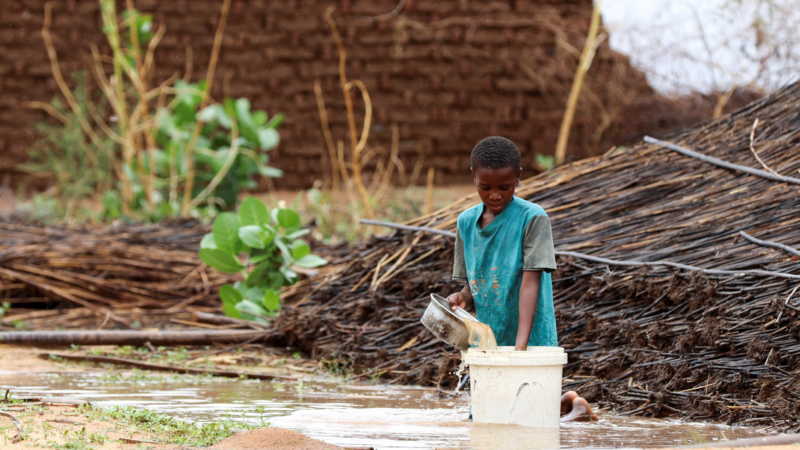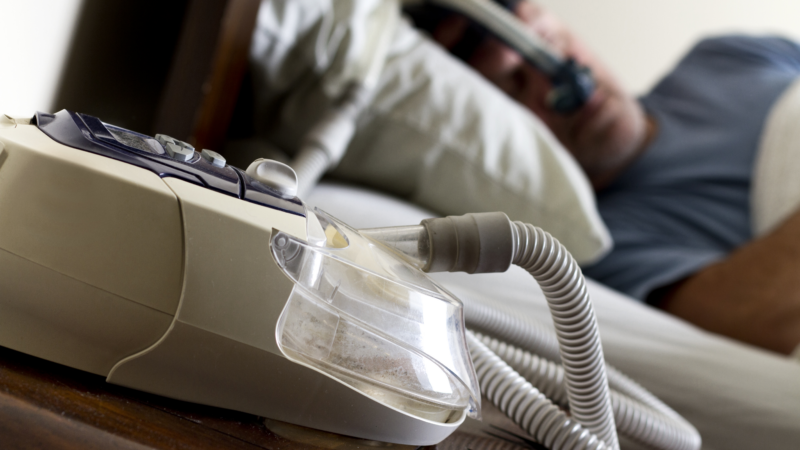Nationwide IV fluid shortage changing how hospitals manage patient hydration
Hospitals around the country are conserving critical intravenous fluid bags to cope with a shortage that may last months. Some hospital administrators say they are changing how they think about IV fluid hydration altogether.
Hurricane Helene, which hit North Carolina in September, flooded a Baxter International facility that produces 60% of the IV fluids used in the U.S., according to the American Hospital Association.
The company was forced to stop production and is rationing its products. In an update posted Nov. 7, Baxter said its facility in Marion, N.C., has resumed producing some IV fluids.
On Monday, Health and Human Services Secretary Xavier Becerra toured the damaged factory.
He spoke to reporters near a temporary bridge that was rebuilt after the storm. It’s now being used by trucks to transport IV products.
“When Baxter said, ‘We need to figure out how to transport product, we don’t have a functioning bridge anymore,’ everyone stepped up. And while HHS isn’t recognized for building bridges, we were able to help with FEMA in making that all possible,” Becerra said.
In an email to KFF Health News, the company wrote that customers will be able to order normal quantities of “certain IV solutions products” by the end of the year, but there is no timeline for when the North Cove facility will be back to pre-hurricane production levels.
Meanwhile, hospitals are facing seasonal strains on their already limited IV fluid resources, said Sam Elgawly, chief of resource stewardship at Inova, a health system in the Washington, D.C., area.
“We’ve been very aggressive in our conservation measures,” Elgawly said, stressing that he does not believe patient care has been compromised. He told KFF Health News that across the system IV fluid usage has dropped 55% since early October.
Elgawly called the shortage a crisis that he expects to have to continue managing for some time.
“We are going to operate under the assumption that this is going to be the way it is through the end of 2024 and have adopted our demand/conservation measures accordingly,” he said.
At the end of the calendar year, many patients with insurance hurry to schedule surgical procedures before their deductibles reset in January.
Elgawly is eyeing that typical surgical rush and the impending peak of respiratory virus season as he tries to stockpile IV fluid bags.
Hospitals such as Inova’s are using different ways to conserve, such as giving some medications intravenously but without a dedicated IV fluid bag, known as a push medication.
“You don’t even need a bag at all. You just give the medication without the bag,” he said.
“There has been increasing literature over the last 10 to 20 years that indicates maybe you don’t need to use as much. And this accelerated our sort of innovation and testing of that idea.”
Monica Coleman is a nurse at a Department of Veterans Affairs hospital in North Chicago. She said using push medications takes more time out of a nurse’s already hectic schedule because then they need to monitor the patient.
“This could increase adverse effects within the patient, because we’re giving the medication at a faster rate,” she said.
Elgawly is also interested in retooling electronic health records to question doctor orders for more IV hydration.
“Does the patient actually need that second bag? How did they do today with eating or drinking water or juice? They did well? They don’t need the bag. So it’s little conservation mechanisms like that that, when you add them across, you know, the 2,000-patient system that Inova is, make a significant dent,” he said.
Simpler conservation measures could become common after the shortage abates, said Vince Green, chief medical officer for Pipeline Health, a small hospital system in the Los Angeles area that mainly serves people on Medicare and Medicaid.
First, Green would like to see data showing that patient outcomes aren’t affected. But for now, some of the new strategies just make sense to him. He has directed hospital staff to use up the entire IV bag before starting another.
“If they come in with IV fluids that the paramedics have started, let’s continue it. If it saves half a bag of fluids, so be it, but it adds up over time,” he said.
Patients may be asked to take more accountability for their hydration, by drinking Gatorade or water rather than the default of hydrating through an IV, he said.
“From an environmental aspect, we don’t need to have this much waste and fill up our landfills. If we could reduce stuff, I think it’d be wise,” he said.
But he’ll feel better when his hospitals receive a full order, which could be weeks away. Green said they are down to a two-week supply, with an expected increase in hospitalizations due to respiratory virus season.
“We’re purchasing every IV fluid bag that we can get,” he said.
This story comes from NPR’s health reporting partnership with KFF Health News, a national newsroom that produces in-depth journalism about health issues. KFF Health News is one of the core operating programs at KFF — the independent source for health policy research, polling, and journalism.
Transcript:
MICHEL MARTIN, HOST:
Here is another challenge for the new administration. It will inherit a public health system struggling to adjust to natural disasters. When Hurricane Helene blew ashore, it flooded a North Carolina plant that makes more than 60% of the nation’s IV fluid bags. Hospitals are still looking at months of IV fluid shortages, and it’s not clear when the plant will return to full production, so some hospitals are finding new ways to get by. Jackie Fortier, with our partner KFF Health News, tells us more about this.
JACKIE FORTIER, BYLINE: In late September, Hurricane Helene tore through the South, surprising residents like emergency room nurse Ashley Bunting.
ASHLEY BUNTING: I’m from Florida originally, and I moved up to the mountains thinking, oh, I’m never going to be impacted by a hurricane here.
FORTIER: Bunting cares for patients at Mission Hospital in Asheville, North Carolina. It’s been more than a month, and the water coming out of the hospital taps still isn’t safe to drink.
BUNTING: We’re kind of limited to water bottles. We can’t give our patients ice chips, like many of them request.
FORTIER: And the IV fluids Bunting could use instead are still in short supply. Before Hurricane Helene, one company, Baxter, produced 1.5 million IV bags at its North Carolina facility, more than half of what U.S. hospitals use. But when the factory flooded, production ground to a stop.
BUNTING: Maybe getting 60% of our IV fluids from one single source isn’t the smartest long-term plan.
FORTIER: The factory has re-opened and is producing some IV bags, but the earliest they’ll start to ship is late November. More than a thousand miles north in Presque Isle, Maine, Nurse Nicole Bridges is also coping with the shortage at AR Gould Hospital. She says they’re transitioning patients from IV antibiotics to oral antibiotic pills sooner than they used to.
NICOLE BRIDGES: I think the workaround right now is working really well. I don’t know what it’s going to look like next week or next month.
FORTIER: The most fragile patients at most hospitals are still getting medications via IV, but some hospital administrators see an opportunity in the shortage. Dr. Sam Elgawly is with Inova Health in the Washington, DC, area.
SAM ELGAWLY: How often are we actually giving it more than we need to, or do we just, you know, just keep it going because a patient’s in the hospital?
FORTIER: In their five hospitals, they’ve slashed IV fluids by about 55%. But surgical demand will soon go up. Typically, patients try to cram procedures in before the insurance cycle ends in December and deductibles reset. One way Inova is conserving IV bags is by skipping extra fluids with some medications.
ELGAWLY: You would do what’s called push a medication. You don’t even need a bag at all. You just give the medication without the bag. There has been increasing literature over the last 10 to 20 years that indicates maybe you don’t need to use as much, and this accelerated our innovation and testing of that idea.
FORTIER: But some nurses say doing that can be more labor-intensive. Dr. Vince Green is with Pipeline Health, a small hospital system in the Los Angeles area. They are only getting half the IV bags they’d normally receive.
VINCE GREEN: Every IV fluid bag that we can get we’re purchasing and we’re keeping. We’re trying to get our hands on everything we can.
FORTIER: Green says medical staff are encouraging patients to drink Gatorade or water instead of defaulting to IVs for hydration, and they make sure to use up the entire bag before starting another.
GREEN: If they come in with IV fluids that the paramedics have started, let’s continue it. If it saves half a bag of fluids, so be it, but it adds up over time.
FORTIER: Some of these conservation measures could become permanent. First, Dr. Green would like to see data showing that patient outcomes aren’t affected. For now, some of the new strategies just make sense to him.
GREEN: We don’t need to have this much waste and fill up our landfills with stuff, that if we could reduce stuff, I think it’d be wise.
FORTIER: Green is still worried for the near future. They are down to a two-week supply, and respiratory virus season is just around the corner.
MARTIN: That’s reporter Jackie Fortier with our partner KFF Health News.
Party City files for bankruptcy and plans to shutter nationwide
Party City was once unmatched in its vast selection of affordable celebration goods. But over the years, competition stacked up at Walmart, Target, Spirit Halloween, and especially Amazon.
Sudan’s biggest refugee camp was already struck with famine. Now it’s being shelled
The siege, blamed on the Rapid Support Forces, has sparked a new humanitarian catastrophe and marks an alarming turning point in the Darfur region, already overrun by violence.
FDA approves weight loss drug Zepbound to treat obstructive sleep apnea
The FDA said studies have shown that by aiding weight loss, Zepbound improves sleep apnea symptoms in some patients.
Netflix is dreaming of a glitch-free Christmas with 2 major NFL games set
It comes weeks after Netflix's attempt to broadcast live boxing between Jake Paul and Mike Tyson was rife with technical glitches.
Opinion: The Pope wants priests to lighten up
A reflection on the comedy stylings of Pope Francis, who is telling priests to lighten up and not be so dour.
The FDA restricts a psychoactive mushroom used in some edibles
The Food and Drug Administration has told food manufacturers the psychoactive mushroom Amanita muscaria isn't authorized for food, including edibles, because it doesn't meet safety standards.







